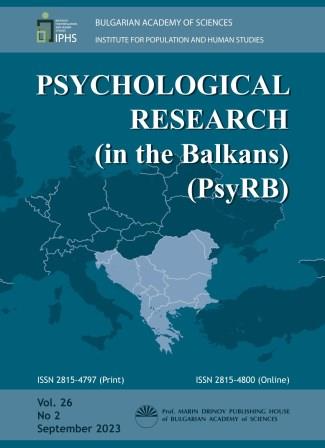AN EDUCATIONAL APPROACH FOR PROMOTING ACTIVE PARTICIPATION OF 3-4-YEAR-OLD CHILDREN FROM THE ROMA COMMUNITY IN SOFIA IN THE PROCESS OF LEARNING SCIENCE IN KINDERGARTEN
AN EDUCATIONAL APPROACH FOR PROMOTING ACTIVE PARTICIPATION OF 3-4-YEAR-OLD CHILDREN FROM THE ROMA COMMUNITY IN SOFIA IN THE PROCESS OF LEARNING SCIENCE IN KINDERGARTEN
Author(s): Antoaneta Mateeva, Penka Hristova, Nadia Koltcheva, Bojan Vasilev, Tsvetina Ivanova-Shindarska, Emilia Mikova, Savka SavovaSubject(s): Social Sciences, Psychology, Sociology, Social psychology and group interaction, Developmental Psychology, Personality Psychology, Ethnic Minorities Studies
Published by: Институт за изследване на населението и човека - Българска академия на науките
Keywords: Science education; Child participation; Kindergarten children; Roma children; Inclusive education.
Summary/Abstract: This article presents a portion of the research data collected as part of the international applied research project “Communities for Sciences - Towards Promoting an Inclusive Approach in Science Education.” The project aims to promote inclusive science activities for children and youth in six different European locations. The findings of a project-based collaboration between researchers and kindergarten teachers of 3 groups of 3-4 years old Roma children from Faculteta neighborhood in Sofia are reported. The teachers work at 2 kindergartens situated in this location and run by the Health and Social Development Foundation (HESED). Participatory action research methodology was used to explore the opportunities for the three teams of teachers to apply more inclusive approaches in teaching science to children. Further, the article presents kindergarten teachers’ implicit knowledge and practices concerning child participation in the learning process. The teachers’ practices are discussed within the framework of a theory on levels of child participation. The article emphasizes the importance of creating an appreciative and supportive culture of relationships among teachers in the organization, which allows for an inclusive educational approach to be applied to their work with children. Additionally, the article discusses how broader educational and social contexts can either support or hinder teaching teams in applying their educational approach. The data collected should offer insights on how to develop more effective strategies for implementing inclusive science proposals that meet the specific needs of local communities. This can be achieved through co-creation and active citizen participation.
Journal: Psychological Research (in the Balkans)
- Issue Year: 26/2023
- Issue No: 2
- Page Range: 17-30
- Page Count: 14
- Language: English

